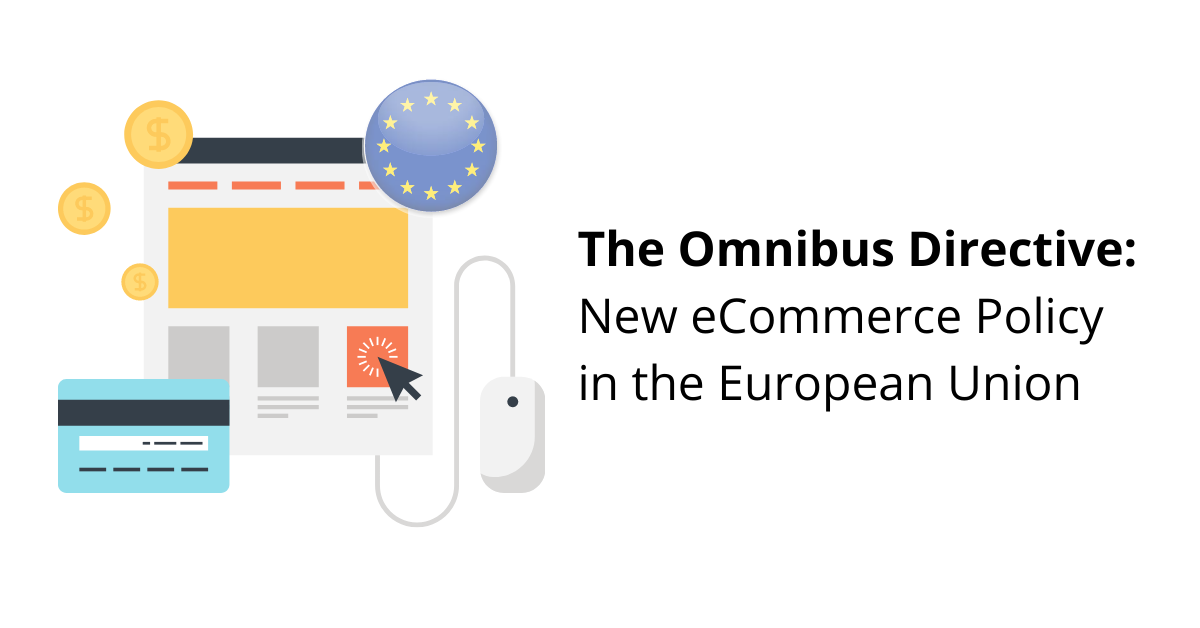Directive (EU) 2019/2161 or the Omnibus Directive is based on the “New Deal of Consumers” initiative adopted by the EU Commission to enhance the implementation of EU consumer laws. The new Directive is specifically concerned with protecting eCommerce consumers and updating existing digital content regulations.
The EU Member States must implement the Omnibus Directive into their national laws by 28 November 2021, and ensure that national legislations become effective beginning on 28 May 2022.
Here are the highlights of the Omnibus Directive that eCommerce businesses should be aware of.
Article 2 (1): Price Reduction
Any announcement of a price reduction shall indicate the previous price applied by the trader. This should be done during a determined period of time prior to the implementation of the price reduction.
- The previous price means the lowest price applied by the trader during a period of time not shorter than 30 days prior to the application of the price reduction.
- The EU Member States may provide for different rules for goods which are liable to deteriorate or expire rapidly. Hence, the rules may vary depending on which EU State an eCommerce business is registered in.
- Where the product has been in the market for less than 30 days, Member States may also provide for a shorter period of time than the period specified above. Again, the rules may vary depending on which EU State a business is registered in.
Article 3 (3): “Dual Quality” Products
Products with identical packaging or very similar presentation but significantly different composition may not be sold or marketed in different countries. An exception is when the differences can be justified by legitimate and objective factors (which have not been defined anywhere so the exception is open to interpretation).
Article 3 (4): Professional Trader vs Private Individual
Consumers must be informed of whether the entity selling the goods or services online is a trader or another private individual. Consumers must be warned that EU consumer protection rules do not apply when the supplier is not a trader. That is, if goods are purchased from a private individual (who simply operates their own shop) and not a professional trader, then consumer rules do not apply. Consumers must be made aware of this.
Article 3 (4a): Search Results
eCommerce companies must inform customers about the main criteria that determine the ranking of the offers provided in response to a search, e.g., whether the offers are ranked based on price, ratings, or a combination of different criteria. If the ranking of the search results is based on payments received from the listed traders, this must also be clearly communicated to the consumers.
Article 3 (4c): Consumer Reviews
Where a trader provides access to consumer reviews of products, eCommerce companies must take reasonable and proportionate steps to ensure that these reviews are authentic. For example, checks should be in place to ensure that only consumers who have purchased or used the goods or services may submit a review. Traders that make consumer reviews available must also explain to their customers how they ensure that reviews come from genuine consumers.
Article 4 (4)(ii) (ea): Special Algorithms
eCommerce companies can use algorithms to detect whether consumers have a special interest in their goods or services. These companies can then increase the price of goods or services based on a consumer’s purchase history or the web pages they visit. Now, traders have to inform consumers each time the price presented to them online is based on an algorithm taking into account their online behavior. This is to ensure that consumers are aware of the risk that the asking price may have increased specifically for them.
Article 3 (1) (c): Free Services
Consumers use many different free services that the traders provide in exchange for consumer data (so in reality they are not free). And EU consumer rights apply only to paid services, not free services. When the Omnibus Directive enters into force, the EU consumer protection rights will also apply to these free services and consumers will also be able to cancel the online contract within 14 days without providing a reason. Providers of the “free” services will have to provide clear information about the main characteristics of the service, the contract duration, and the termination conditions.
The Omnibus Directive affects all eCommerce businesses operating in the European Union. If you want to know more about how the Directive will impact your business or need eCommerce-specific legal advice, you may reach out to us and we’ll be happy to point you in the right direction.



Share on: